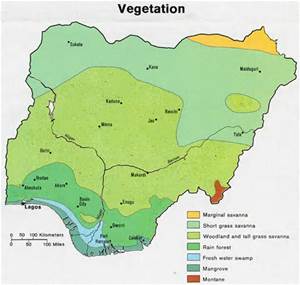Nigeria got its name from the great river Niger flowing through the heart of the country. It has the biggest population 105 million, than any other African country.
Nigeria is one of the richest on the continent but due to corruption the people loosing out on prosperity.
The country borders Benin to the west. Niger to the north, Chad on the north-east and Cameroon on the east. The Gulf of Guinea at the south. Nigeria is the size of France, Britain, Belgium,, Holland and Luxemburg together. Area wise it is the 14th largest country in Africa
 |
| The capital is Abuja |
In the south is the swampy Niger delta; north of the delta a tropical rainforest and further on are the rolling grassy plans known as the savannah. On the very north the land called Sahel a very arid southern edge of the Sahara Desert.
The river Niger which is Africa's third longest river flows from the north-west of the country through the centre and into the Gulf of Guinea. Another big river Benue flows southwards from the east of the country and into the Niger.
The best place to watch wildlife is at the Yamkari Game Reserve in central Nigeria with herds of elephants, baboons, crocodiles,
hippopotamuses and buffaloes.
In the north-east is the Lake Chad which Nigeria shares it with Niger, Chad and Cameroon.
It is hard or even impossible to define which part belongs to which country. The lake seize varies from 20,000 sq km in the dry season to 50,000 sq km in the wet season.
Economy and people
Over half of the Nigerians are farmers. In the north groundnuts (peanuts), cotton and sugar cane are grown, In the south cocoa, rubber and kola nuts. The Fulani of the north keep large herds of cattle, sheep and goats.
Before the 1970, when Nigeria gave priority to industry, it grew all the food for the country and more. which was exported. Now the Government if trying to make Nigeria self-sufficient in food again.
Nigeria's biggest export is in oil which amounts to 90 per cent of its income.
In Nigeria are around 400 separate languages. Some amount only to a few thousands. the largest groups are the Hausa and Fulani living in the north, the Yoruba in the south-west and the Ibo in the south-east.
They are making two-thirds of the population. Each group is different and have their own festivals which usual are drumming, dancing and feasting. They could go on for days.
History
Nigeria's history spans back to Nok civilisation around 2500 years ago. Over the 16 centuries it developed into today's way of life with the four main groups firmly established.
When the European arrived in the 16th century forcing Nigerians into slaves for the next 300 years and the Nigerian coast became its centre.
When the slave trade came to an end Britain increased its control over the country and completely ruled it by 1914.
Independence
Nigeria became independent in 1960 and had the usual political upheavals
A civil war started in 1967 which established an independent state, Biafra, costing many casualties but led to victory.
Nigeria faced 20 years and still has economic mismanagement, large scale corruption, political instability including a succession of civilian and military government.



Nice article. At one time, Nigeria was going to lend Britain money. Free of corruption, it could truely be a power house.
ReplyDeleteThank you for your praise and additional information.
ReplyDelete